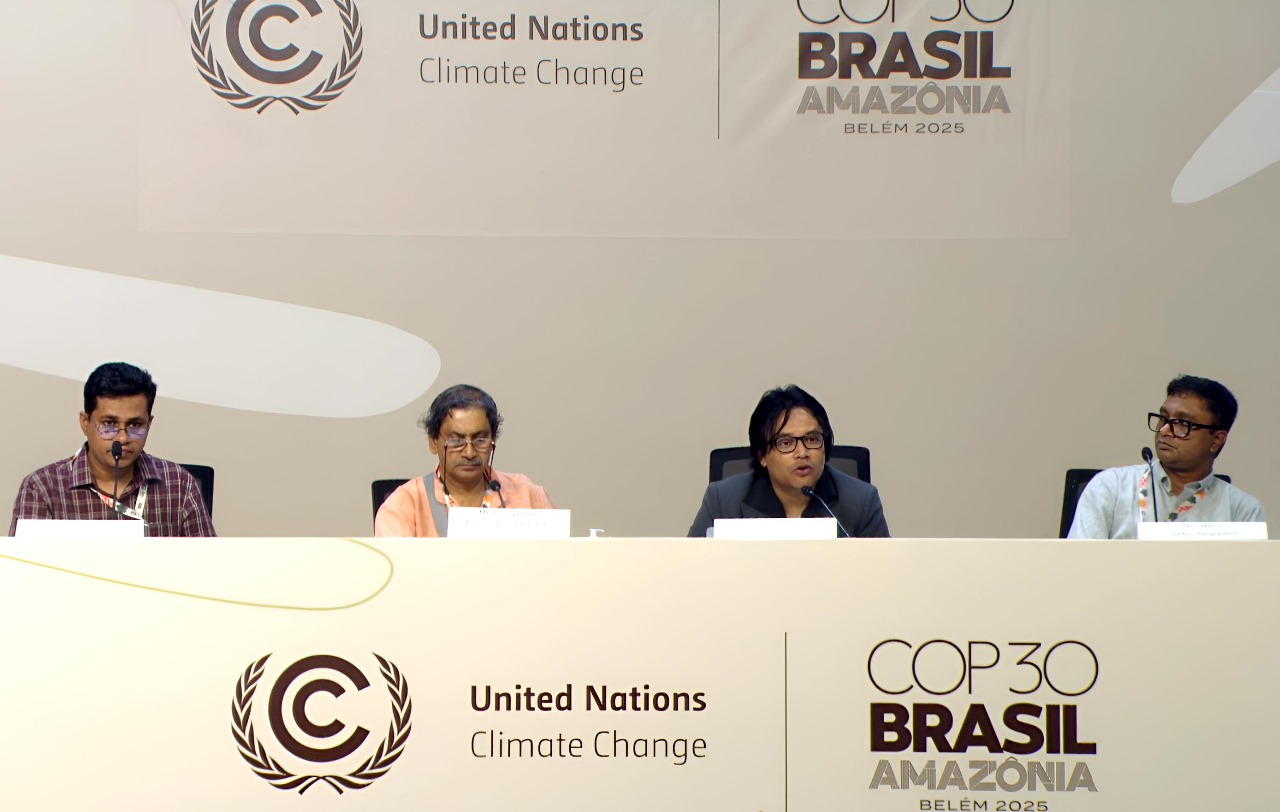02/19/2026

Struggle will be continue until trillion-dollar needs are met
Mustafa Kamal Akanda | Published: 2025-11-12 13:27:22

During the ongoing Belem [CoP 30] Climate Conference, the leaders of South Asian Civil Society gathered in a press conference and demanded the assurance of the “Baku to Belem” Roadmap.
They emphasized to keep our struggle and advocacy with developed countries continue until trillion-dollar climate finance needs are met.
Apart they hope the Parties must submit their NDC 3.0 with consistently ambitious, transformative, and 1.5°C temperature-integrated mitigation goals, and triple adaptation finance by 2030 as part of an ambitious New Collective Quantified Goal (NCQG) to effectively protect vulnerable communities on the frontlines of the climate crisis.
The press conference, titled "LDCs & MVC Peoples’ Expectations and CoP 30," took place at the CoP 30 climate conference center in Belem, Brazil.
Representatives from various Civil Society Organizations (CSOs), including Mr. Shoumya Dutta from India, Ahsanul Wahed from MJF, Mr. Jakaria from Leaders Bangladesh, and many others, participated and shared their valuable insights during the discussion. The event's written statement read by M.A. Hasan of COAST Foundation.
M. A. Hasan criticized developed countries for creating frameworks those look good on paper but fail to deliver in practice. After ten years of Paris Agreement, COP-30 is a great opportunity for a reality check on progress, identifying gaps, and defining our role and contribution for appropriate financial support & techniques to achieve the goal of 1.5 degree through phase out of fossil fuel he added.
He demands a clear, fair, and time-bound pathway to implement NCQG decision, which must address the trillion-dollar annual goal by 2035 through public finance, while fully considering the needs & special circumstances of LDCs & MVCs.
Mr. Shoumya Dutta said, we anticipate that COP 30 will be able to establish a definitive timeline for phasing out fossil fuels, leading to their complete elimination and aligning with the submitted NDC-3. It should also make a significant decision to immediately phase out all coal-based power plants and fossil fuel subsidies. Parties must go for deeper emissions cuts through shift away the fossil fuels as urgent, tripling global renewable energy capacity, and doubling global energy efficiency improvements by 2030.
He called for detailed roadmaps on implementation strategies, including sector-specific targets, timelines, and comprehensive plans for necessary resources and funding.
Mr. Ahsanul Wahed said, we are calling for a clear and credible roadmap to finalize measurable and meaningful indicators for the Global Goal on Adaptation (GGA). Developed countries always move with vague commitments that a cause suffering of vulnerable countries. They should avoid this behavior and give a real commitment to drive real progress in enhancing adaptive capacity, strengthening resilience, and reducing climate vulnerability.
Mr, Zakaria said, our demand is for rapid, direct, and simplified access to the Fund for Responding to Loss and Damage (FRLD), prioritizing frontline communities who are already bearing the brunt of climate impacts. The COP 29 outcome on the NCQG failed to secure long-term finance to address loss and damage.
It is therefore imperative for COP 30 that the NCQG Roadmap include a sub-goal on Loss and Damage finance with clear options for the provision of public, grant-based resources to developing countries.
Participants in the press conference put their opinion and expect the CoP 30 to reach a real commitment in reducing global temperature that obviously led by necessary finance and technology support for climate vulnerable countries from developed countries.
Editor & Publisher : Md. Motiur Rahman
Pritam-Zaman Tower, Level 03, Suite No: 401/A, 37/2 Bir Protik Gazi Dastagir Road, Purana Palton, Dhaka-1000
Cell : (+88) 01706 666 716, (+88) 01711 145 898, Phone: +88 02-41051180-81